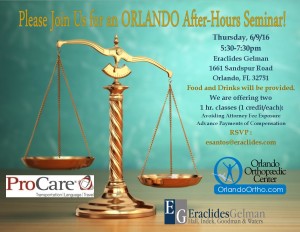Greetings,
Due to the Castellanos decision, we are now seeing many claimant attorney’s seek attorney fees on issues that were resolved long ago. As you may recall, under the Longley case, if all issues are dismissed with the exception of a reservation on entitlement to attorney fees, the Statute of Limitations is tolled.
However, if you resolve that fee (or the reservation is dismissed), the SOL begins to run, NOT from that point, but from the last provision of a benefit. In the 2015 Sanchez case (summarized below and attached), the 1st DCA reiterated payment of an attorney’s fee is not a benefit that will extend the SOL. For example:
- D/A: 1/1/12
- PFB dismissed: 1/1/13 (with reservation on fee entitlement)
- Last benefit provided: 6/1/13
- If you pay the fee on 6/1/16, that ends the reservation, and the SOL reverts back to the last provision of benefits (since we are more than 2 years from the D/A), and the SOL ran retrocactively on 6/1/14, assuming no other PFB’s are pending and no other fee reservations.
So, do not fear resolving fees for SOL reasons, it can actually be a positive move. You pay the fee but it may end the claim due to the SOL.
And for more fun with attorney fees, please join us at our afterhours CEU in the Orlando office this Thursday, flyer attached. 2 CEU credits RSVP to esantos@eraclides.com
Sanchez v. Am. Airlines, 169 So. 3d 1197, 1197-1198 (Fla. Dist. Ct. App. 1st Dist. 2015)
Claimant argued the JCC erred in finding the Statute of Limitations barred his April 2014 PFB. Claimant’s April 2014 PFB was filed more than two years after the Claimant’s date of injury and more than one year after the last provision of medical or indemnity benefits. However, the PFB was filed within one year of when the JCC had dismissed a prior PFB and ordered the Employer/Carrier to pay attorney’s fees to the Claimant’s counsel. The issue presented before the Court was: whether the payment of attorney’s fees to Claimant’s counsel – with no other medical or disability benefits being paid simultaneously to the Claimant and no PFBs pending – is sufficient to extend the statute of limitations under Florida Statutes? The First DCA affirmed the JCC’s decision, noting in part the Longley, decision provided an attorney fee reservation pending within a PFB tolls the statute. In this case, because there was no PFB pending (with entitlement to attorney’s fees ordered upon and the petition otherwise dismissed) the Longley SOL tolling was inapplicable and the April 2014 PFB was validly dismissed by the Court. The Court also noted that payment of attorney’s fees is neither a payment of compensation nor the furnishing of medical treatment – the only two events which will extend the statue of limitations. The principal distinction from Longley is the lack of pending/outstanding issue of entitlement to attorney’s fees in the case at bar. Had attorney fee entitlement not have been ordered on by the Court or otherwise paid, the Claimant’s PFB would remain tolled by the SOL as in Longley.
Sincerely,
RICARDO SANCHEZ,
Appellant,
v.
AMERICAN AIRLINES AND SEDGWICK CMS,
Appellees.
IN THE DISTRICT COURT OF APPEAL FIRST DISTRICT, STATE OF FLORIDA NOT FINAL UNTIL TIME EXPIRES TO FILE MOTION FOR REHEARING AND DISPOSITION THEREOF IF FILED
CASE NO. 1D14-4907
_____________________________/
Opinion filed July 14, 2015.
An appeal from an order of the Judge of Compensation Claims.
Margret G. Kerr, Judge.
Date of Accident: August 25, 2011.
Toni L. Villaverde of Toni L. Villaverde, PLLC, Coral Gables, for Appellant.
Clinton C. Lyons, Jr., and Frank Garcia of Moran, Kidd, Lyons, Johnson, P.A.,
Miami Lakes, for Appellees.
PER CURIAM.
In this workers’ compensation case, Claimant argues that the Judge of Compensation Claims (JCC) erred in finding that his April 2014 petition for benefits (PFB) was barred by the statute of limitations in section 440.19, Florida Statutes (2011). Finding no error in the JCC’s application of the law to the facts, we affirm.
Subsection (1) of section 440.19 provides generally that a PFB must be filed within two years after the date of injury or it will be barred, and subsection (2) provides that the only events that will extend the statute of limitations are the payment of indemnity benefits or the furnishing of medical treatment. Here, the April 2014 PFB was filed more than two years after Claimant’s date of injury and more than one year after the last provision of medical or disability benefits, but it was filed within one year after the JCC dismissed a prior PFB and ordered the employer/carrier to pay attorney’s fees to Claimant’s counsel. Consequently, the narrow question presented in this case is whether the payment of attorney’s fees to Claimant’s counsel—with no other medical or disability benefits being paid simultaneously to Claimant and no PFBs pending—is sufficient to extend the statute of limitations under subsection 440.19(2). For the reasons that follow, we answer this question in the negative.
Claimant’s previously filed PFB has no bearing on whether the statute of limitations has run because “when an action is dismissed, the statute of limitations is not tolled during the period that the dismissed action was pending; rather, the statute will run as if the dismissed action had never been filed.” McBride v. Pratt & Whitney, 909 So. 2d 386, 388 (Fla. 1st DCA 2005); see also Kinsey v. Skyline Corp., 95 So. 2d 626, 627 (Fla. 1st DCA 1981). This holding is not undercut by Longley v. Miami-Dade County School Board, 82 So. 3d 1098, 1100 (Fla. 1st DCA 2012), upon which Claimant relies. That decision held that a PFB filed before the resolution of a pending attorney’s fee claim is not barred by the statute of limitations because the statute of limitations does not operate while a PFB is pending. Here, because there was no other PFB pending when the April 2014 PFB was filed, Longley is inapplicable.
Claimant also contends that the payment of an attorney’s fee resulting from the prior PFB is sufficient to toll the statute of limitations. We reject this argument because it is well-settled that the payment of an attorney’s fee is neither a payment of compensation nor the furnishing of medical treatment—the only two events that will extend the statute of limitations under subsection 440.19(2). Specifically, this court determined in Houston-Miller v. U.S. Fire Insurance, 668 So. 2d 653, 653-54 (Fla. 1st DCA 1996), that for purposes of determining whether the statute of limitations ran, “payment of an attorney’s fee to the claimant’s attorney is not the ‘payment of compensation’ within the meaning of section 440.19(1)(b), Florida Statutes (1985).” The definition of “compensation” in the 2011 statutes applicable in this case is the same as that in the 1985 statute construed in Houston-Miller. Moreover, even though “indemnity” is not defined in chapter 440, case law recognizes “indemnity” as one of the two categories of benefits provided to a claimant—compensation and medical treatment. See Rene Stone Work Corp. v. Gonzalez, 25 So. 3d 1272, 1273 (Fla. 1st DCA 2010) (explaining one issue on appeal was whether JCC erred by “awarding Claimant temporary indemnity benefits”).
In sum, because the JCC correctly determined that Claimant’s April 2014 PFB is barred by the statute of limitations, we affirm the summary final order dismissing the petition.
AFFIRMED.
THOMAS, WETHERELL, and RAY, JJ., CONCUR.
(Click To Enlarge)


